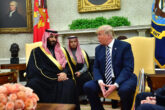
May 23, 2024
Outbound Investment Controls in a U.S. Economic Security Strategy
Testimony before the U.S.-China Economic and Security Review Commission.
Hearing on “Key Economic Strategies for Leveling the U.S.-China Playing Field: Trade, Investment, and Technology”
I. Summary of Testimony
Commissioner Miller, Commissioner Wessel, and members of the U.S.-China Economic and Security Review Commission, thank you for the opportunity to provide testimony. While I am currently employed by the Center for a New American Security (CNAS), I am providing testimony in my personal capacity. The testimony draws from a large body of research that I have conducted at CNAS on economic security issues, as well as my prior experience serving the U.S. public as a proud civil servant in the U.S. Department of Commerce, the National Security Council, and the Office of the U.S. Trade Representative, including most recently serving as the Deputy Assistant U.S. Trade Representative for Investment. I have spent my career in national security roles, but always from the perspective of an economic agency. This perspective has engrained in me a deep appreciation for the strategic advantage that open markets and open capital flows provide the United States.
This testimony focuses on options for designing an effective program to address the national security risks that can arise from certain U.S. investments in China and other countries of concern. As the U.S. government considers establishing new outbound investment restrictions, it must account for a range of policy objectives, including the need to robustly protect U.S. national security, maintain U.S. economic and technological competitiveness, and ensure that any new programs can be effectively administered and enforced. Additionally, many U.S. investments in China do not present national security concerns and should be allowed to proceed so that investors can take advantage of commercial opportunities available in one of the world’s most consequential markets. The analysis and recommendations of this testimony are provided with these objectives in mind.
A summary of recommendations for congressional consideration is as follows:
- Codify and provide resources for a targeted and proportionate set of outbound investment controls focused on transactions that may enable China’s indigenous development of technologies critical to U.S. national security interests;
- Enhance transparency around investments made in China, including by establishing new requirements to notify the government of investment transactions involving high-risk technologies;
- Prohibit U.S. investments in Chinese entities that produce, design, test, manufacture, fabricate, or develop high-risk technologies, including military items, advanced semiconductors and related equipment and software, and frontier artificial intelligence (AI) systems;
- Consider additional prohibitions related to quantum information systems, hypersonics, and supercomputing;
- Expand the non-SDN Chinese Military-Industrial Complex (non-SDN CMIC) program to prohibit all types of investments in listed entities and to authorize the listing of Chinese entities that produce, design, test, manufacture, fabricate, or develop high-risk technologies;
- Exercise strategic restraint on the use of full blocking financial sanctions;
- Encourage alignment of U.S. outbound investment policies with those of key international partners;
- Require independent evaluation of any new outbound investment authorities to ensure they are being implemented in a manner consistent with Congress’s national and economic security objectives; and
- Establish, or require the executive branch to establish, an economic security strategy to guide the use of all economic security tools in pursuit of a defined set of objectives related to U.S.-China strategic competition, including how outbound investment controls fit into this broader strategy.
This testimony draws from joint work conducted by the author and Sarah Bauerle Danzman, associate professor of international studies at Indiana University and resident senior fellow with the Atlantic Council, including the report Sand in the Silicon: Designing an Outbound Investment Mechanism published jointly by the Atlantic Council and CNAS. The testimony also draws from prior testimony provided before the U.S. Senate Committee on Banking, Housing, and Urban Affairs, the U.S. House of Representatives Committee on Financial Services Subcommittee on National Security, Illicit Finance, and International Financial Institutions, and the U.S.-China Economic and Security Review Commission. Citations to these prior publications, and other resources that may aid the Commission’s work, are included at the end of the testimony.
II. Introduction
Certain U.S. investments in China present national security risks that are not addressed by existing U.S. authorities. U.S. firms and investors may, in some cases, be supporting the development of critical technologies in China that have important national security applications. These include investments related to chips, AI, or other technologies that can accelerate advances in Chinese military capabilities.1 Just as U.S. law and policy have long recognized that the export of certain technologies can be counter to U.S. security interests, so too can certain overseas investments if such investments are contributing to increasing military capabilities of competitor nations. The goal of an outbound investment program is not to impose broad capital controls, but to instead address the specific transactions through which critical, non-technical industrial knowhow may transfer to China and to plug a specific gap that export controls cannot fill in the technology competition with China.
U.S. policymakers are currently debating whether and how to regulate U.S. investments in China. The administration has released an executive order, with an accompanying advanced notice of proposed rulemaking (ANPRM), outlining a targeted proposal to mandate notifications of—and in some cases, prohibit—certain U.S. investments into China’s AI, semiconductor, and quantum technology ecosystems.2 Congress has considered a range of proposals, with current efforts in the Senate coalescing around a mandatory notification program.3 Debate remains ongoing in the House of Representatives, with the House Financial Services Committee advancing legislation that leans more heavily on traditional sanctions tools to address concerns with outbound investment.4 A proposal from House Foreign Affairs Committee Chairman Michael McCaul (R-TX) and Ranking Member Gregory W. Meeks (D-NY) advanced a sectoral approach to outbound investment restrictions.5 The House Select Committee on the Strategic Competition between the United States and the Chinese Communist Party, in its 2023 bipartisan report on the U.S.-China economic relationship, recommended an approach that blends both sectoral restrictions and entity-based investment restrictions.6
III. Need for Congressional Action
Congress has an essential role in establishing any new outbound investment authorities. While substantively the administration’s executive order generally aligns with the recommendations of this testimony, implementing these authorities under executive action is not optimal over the longer term. The International Economic Emergency Powers Act (IEEPA) provides sufficient authority for the President to establish outbound investment restrictions. However, a legislative solution would ultimately provide a more durable policy response, as executive orders can be rescinded by subsequent administrations. Legislation also avoids the mission creep that has been associated with recent use of IEEPA for a range of China-related threats, many of which present serious national security and foreign policy concerns but may not strictly speaking constitute “emergencies” as originally envisioned in IEEPA. Brennan Center research has noted that the President’s use of IEEPA is “virtually unchecked,” calling in to question whether the extensive use of IEEPA as a routine foreign policy tool erodes the checks and balances between the executive and legislative branches.7
A strong congressional role would ensure that any new outbound program is designed in parallel with a consideration of the resources required for effective implementation and enforcement. Congress’s keen focus on resources during the 2018 process to modernize the Committee on Foreign Investment in the United States (CFIUS) was commendable, enabling CFIUS to effectively implement its expanded mandate. A similar resource assessment process should accompany the establishment of an outbound investment program.
Congress also has a role in determining the operational structure of a new outbound investment program. The Department of the Treasury is best situated to lead a new outbound investment program. The Treasury experience chairing CFIUS, as well as its lead role in implementing U.S. sanctions, give it unique strengths and insights when it comes to tracking international investments and global financial flows. Congress should create a new office to lead an interagency outbound investment program and place it under the leadership of the Assistant Secretary for Investment Security or the Under Secretary for Terrorism and Financial Intelligence. The outbound investment authorities should not be located within CFIUS, as this process is already under significant strain and Congress should seek to reduce rather than increase the burdens on CFIUS.8 The Departments of Commerce, Defense, Energy, and State should also have a role, given the need to align outbound investment restrictions with export controls. The Office of the Director of National Intelligence should be tasked to provide threat assessments in support of the outbound investment program.
Download the Full Testimony
- Emily S. Weinstein and Ngor Luong, U.S. Outbound Investment into Chinese AI Companies (Washington, D.C.:, Center for Security and Emerging Technologies, February 2023), https://cset.georgetown.edu/publication/u-s-outbound-investment-into-chinese-ai-companies/; and Alex Alpers and Eduardo Baptista, “China chip firm powered by US tech and money avoids Biden’s crackdown,” Reuters, December 13, 2023, https://www.reuters.com/technology/china-chip-firm-powered-by-us-tech-money-avoids-bidens-crackdown-2023-12-13/; ↩
- White House, Executive Order on Addressing United States Investments in Certain National Security Technologies and Products in Countries of Concern, Washington, D.C., August 9, 2023, https://www.whitehouse.gov/briefing-room/presidential-actions/2023/08/09/executive-order-on-addressing-united-states-investments-in-certain-national-security-technologies-and-products-in-countries-of-concern/; ↩
- Karen Freifeld and Andrea Shalal, “US senators push China investments tracker in defense bill as White House finalizes order,” Reuters, July 14, 2023, https://www.reuters.com/world/us/us-senators-push-china-investments-tracker-defense-bill-white-house-finalizes-2023-07-14/.; ↩
- U.S. House of Representatives Financial Services Committee, “McHenry, Subcommittee Chairs Urge House and Senate Armed Services Committee Leadership to Reject Misguided Outbound Investment Regime, Prioritize Time-Tested Sanctions and Export Controls,” press release, November 29, 2023, https://financialservices.house.gov/news/documentsingle.aspx?DocumentID=409061.; ↩
- U.S. House of Representatives Foreign Affairs Committee, “McCaul, Meeks Introduce Bill to Restrict Outbound Investment,” press release, November 13, 2023, https://foreignaffairs.house.gov/press-release/mccaul-meeks-introduce-bill-to-restrict-outbound-investment/; ↩
- The Select Committee on the Strategic Competition Between the United States and the Chinese Communist Party, Reset, Prevent, Build: A Strategy to Win America’s Economic Competition with the Chinese Communist Party (Washington, D.C.: U.S. House of Representatives, Select Committee on the Strategic Competition Between the United States and the Chinese Communist Party, December 12, 2023), https://selectcommitteeontheccp.house.gov/sites/evo-subsites/selectcommitteeontheccp.house.gov/files/evo-media-document/reset-prevent-build-scc-report.pdf; ↩
- Andrew Boyle, “Checking the President’s Sanctions Powers” (Washington, D.C.:, Brennan Center for Justice, June 10, 2021), 3, https://www.brennancenter.org/our-work/policy-solutions/checking-presidents-sanctions-powers; ↩
- The Role of Investment Security in Addressing China’s Pursuit of Defense Technologies: Hearing Before the U.S.-China Economic and Security Review Commission, 118th Cong. (2023) (statement of Emily Kilcrease, Senior Fellow and Director, Energy, Economics, and Security Program, CNAS), https://www.uscc.gov/sites/default/files/2023-04/Emily_Kilcrease_Testimony.pdf. ↩
More from CNAS
-
Game Over?
The trade wargame suggests that sustained high tariffs could create leverage and urgency to spur action toward a productive restructuring of the international trade system....
By Emily Kilcrease & Geoffrey Gertz
-
Middle East Security / Energy, Economics & Security
Trump Inks $600 Bn Deal In Saudi Arabia | Musk, Blackrock CEO Flank Trump In Gulf VisitIn today's episode of India Global, U.S. President Donald Trump secured a $600 billion commitment from Saudi Arabia on Tuesday to invest in the United States. NDTV's Gaurie Dw...
By Daniel Silverberg
-
Energy, Economics & Security / Technology & National Security
Tariffs and Tech: An Uncertain RecipeHigher tariffs could prompt American cloud companies to shift more of their capital investments abroad....
By Pablo Chavez
-
Trump Tariffs: How Will U.S. Plans Reshape the Global Economy?
Donald Trump says he's already decided the tariffs he will impose on countries that export goods to America, including the United Kingdom. Channel 4 hears from Emily Kilcrease...
By Emily Kilcrease




